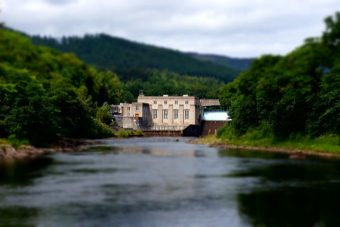
The U.S. Department of Energy has issued a final environmental impact statement for the Northern Pass, calling the proposed transmission line the “preferred alternative” for connecting the northeastern United States to Canadian hydroelectric power.
The line has been controversial throughout its development, with opponents arguing that the line will have a negative impact on property values, the environment and the region’s burgeoning eco-tourism industry.
However, the project’s developer, Northern Pass LLC, said the 192-mile long transmission line will allow New Hampshire and the New England region to tap into 1,090 MW of Hydro-Quebec power, lowering what are, according to U.S. Energy Information Administration data, utility rates more than 50% of the national average.
The report issued by DOE, available for viewing online here, was prepared under terms of the National Environmental Policy Act of 1969 (NEPA) and is a collaboration between DOE, the U.S. Forest Service, White Mountain National Forest, the Environmental Protection Agency, the U.S. Army Corps of Engineers, and the New Hampshire Office of Energy and Planning, amongst others, in addition to multiple rounds of public and stakeholder input.
Details included in the study represent a number of positives for the region, including:
-A reduction of greenhouse gas emissions by 9% per year;
-The creation of nearly 6,750 jobs during construction and more than 900 permanent jobs;
-More than $730 million in economic stimulus through the project’s construction; and
-An increase of nearly $40 million in statewide property taxes in New Hampshire upon completion.
The document also notes that the line will have a “low” to “very low” impact on New England’s scenery, that it will not create any “population-level effects” on protected species, that there are no health risks from electromagnetic fields, and that noise levels associated with its operation fall below EPA guidance levels.
Per DOE, the proposed action is to now “issue a Presidential permit” to Northern Pass LLC for the construction, operation, maintenance and connection of the transmission line.
However, Northern Pass LLC must still clear a number of regulatory hurdles in securing the federal permits required for its construction, including DOE’s own Presidential permit, special use permits from the Forest Service, and Section 404 permitting from USACE.
The developer said it expects to complete the permitting process by the end of this year, with service to begin by the end of the decade.
The Northern Pass is one of several notable cross-border transmission lines being discussed in the northeastern U.S. Also notable is the New England Power Link. Proposed by Champlain VT LLC, the project was approved by the Vermont PUblic Service Board in January 2016. If constructed, the line would allow for the transmission of about 1,000 MW of Canadian hydroelectric power.
Source: hydroworld.com

